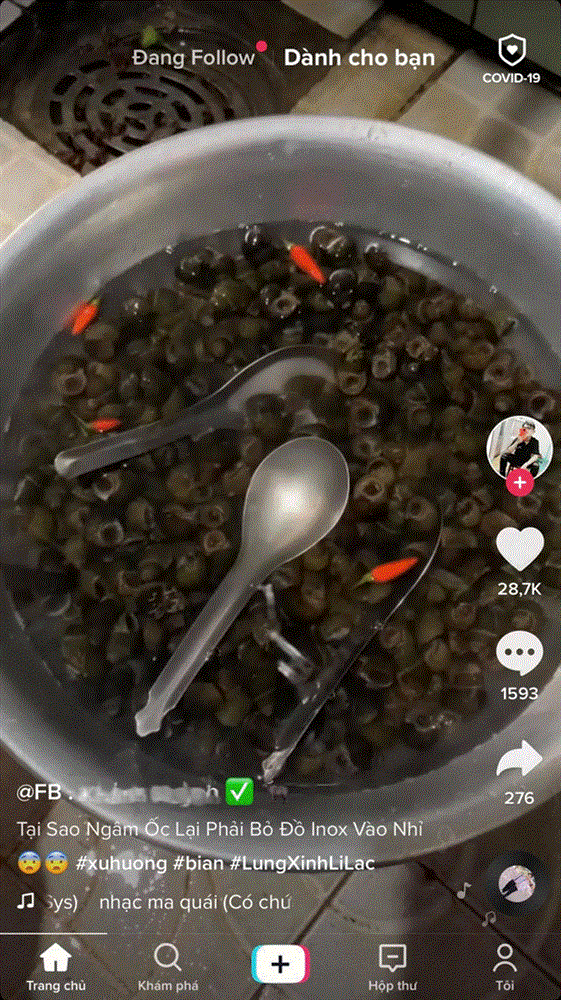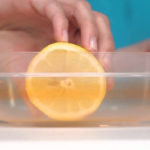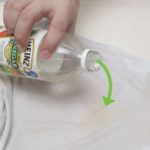Today, TikTok users are in an uproar over a video demonstrating how to clean and prepare snails. Many people are curious about the unusual method of placing an aluminum spoon in a bowl of water to soak the snails.

In this article, we will explain the science behind this practice and provide a step-by-step guide to cleaning and preparing seafood, including snails, clams, mussels, and shrimp.
How to Clean and Prepare Clams, Mussels, Snails, and Cockles
1. Soak in Rice Water
After rinsing the seafood with water, soak the clams, mussels, snails, or cockles in rice water for about 1-2 hours. The rice water helps to draw out any mud or dirt, which will clump together into sticky blobs. Rinse the seafood again 2-3 times with water to ensure it is thoroughly cleaned.

2. Use a Metal Bowl or Utensils to Soak Snails
Snails will quickly release any mud or dirt when exposed to metal. After purchasing snails, soak them in a metal bowl or container. If you don’t have a metal bowl, you can place metal utensils like knives or forks in the water with the snails. Soak for 2-3 hours, and they will release all the dirt and mud.
3. Soak in Vinegar and Chili Water
You can also soak the seafood in a mixture of water, vinegar, and chili. Alternatively, use water mixed with freshly chopped chili. Soak for about 2-3 hours. However, if you use this method, it is best to cook the seafood immediately afterward to retain its freshness and flavor.
Both vinegar and chili are effective in making the snails release any mud, dirt, or slime they may be carrying.
How to Clean and Prepare Clams
1. Shake the Clams Vigorously
First, soak the clams in clean water for about an hour to allow them to open their shells. Then, vigorously stir the water to loosen any dirt or sand attached to the shells or inside the clams. Place the clams in a container with a tight-fitting lid, add water to about two-thirds full, and shake vigorously for about 5 minutes. This will make the clams feel “motion sick,” causing them to release any sand they may be holding.
After shaking, discard the water and soak the clams in fresh water for about 10 minutes.
2. Soak Clams in a Mixture of Vinegar, White Wine, and Salt
Prepare a solution of 2-3 liters of water, 150ml of white wine, 150ml of vinegar, and 5 teaspoons of iodized salt. Stir well to dissolve the salt. Soak the clams in this mixture overnight.
The clams will release any remaining sand and dirt, and you won’t have to put in much effort. Finally, rinse the clams with water 1-2 times to remove the taste of vinegar and wine, and they will be ready for cooking.
How to Clean and Prepare Shrimp
Unlike other hard-shelled seafood, shrimp do not hold mud or sand. When cleaning shrimp, what you want to remove is the vein, which is actually the digestive tract. A simple trick to do this is to use an aluminum spoon. Insert the handle of the spoon into the head end of the shrimp, and you will easily be able to pull out the vein.


How to Get Rid of Fishy Smells from Fish
1. Use Lemon or Lime
Citrus fruits like lemon or lime are very effective in removing fishy smells. After cleaning and gutting the fish, squeeze lemon or lime juice over the flesh or soak the fish for a few minutes before cooking. The citrus juice will permeate the fish, making it taste fresher and more delicious.
This method not only eliminates the fishy smell but also helps remove slime from the skin of slippery fish.

2. Use Wine and Ginger
A combination of wine and crushed ginger is highly effective in removing fishy odors. Crush some ginger and mix it with white wine, then pour the mixture over the fish and let it soak for about 2-3 minutes. Rinse the fish with water once more, and it will be ready for cooking.
3. Use Rice Water or Salt Water
Soaking fish in rice water or saltwater for about 10-15 minutes will help reduce the fishy smell. For fish with a strong odor, you can use salt crystals to rub directly onto the fish’s skin before soaking it in one of the two types of water mentioned above.
We hope you found these seafood cleaning and preparation tips useful! Good luck, and happy cooking!
According to “Phap Luat va Ban Doc” (Law and Readers)





































